Center News |
Max Boykoff Quoted in Daily Camera Article About the University of Colorado Passing Climate Change Resolution |
Excerpt: [Addressing the Boulder Faculty Assembly’s passage of a resolution urging the university community to get involved in the fight against climate change,] “Max Boykoff, an associate professor in CU’s Environmental Studies Program and the director of CU’s Center for Science and Technology Policy Research, said the resolution set a foundation for dialogue between CU researchers and various university and city leaders. Boykoff said the university should be a voice in conversations about climate change that provides information and insight based on the work of its faculty members. ‘As we go into 2017 and the wider context of U.S politics, and scaling down to Colorado with pressures for further exploration, drilling and extraction of oil and gas, that it was important for us to have this statement in place,’ Boykoff said.” |
A Conversation with Max Boykoff: Climate Change and the Media |
|
Excerpt: Tom Brock interviewed Dr. Boykoff in his office on the CU campus on Oct. 20, 2016. Boulder Magazine: Climate change can be an overwhelming topic to many people. Your study of the interface between climate change and public perceptions is fascinating. Please help our readers understand what you do. You describe your field of research as “the cultural politics of climate change.” What does that mean? Max Boykoff: Cultural politics refers to the movement from formal climate science and policy into people’s everyday lives. How decision-making priorities and discussions within science and policy translate into everyday people’s attitudes, intentions, perspectives, beliefs and behaviors about climate change. And how those public attitudes then feed back into the formal processes. So, to what I do. Over time I’ve looked at how media influences public discussion that takes place. I’ve analyzed major network coverage of climate change, and print coverage of climate change in different countries to get a sense of what kinds of issues find traction in the public sphere and which others may be overlooked, and what the effects of that might be. Read more... |
What’s Cooking in Ghana? |
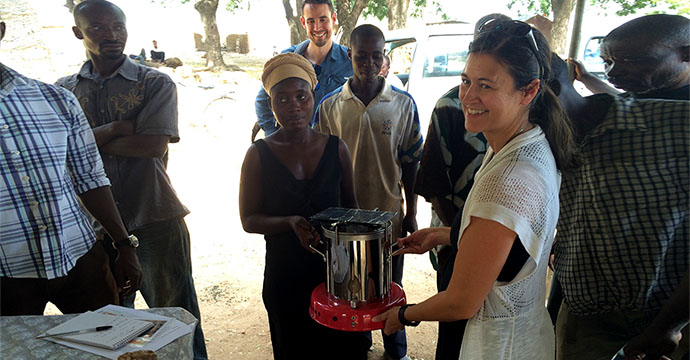 As part of her study, Katie Dickinson presents an improved wood stove to an auction winner that was held in Katiu, Northern Ghana. Photo credit: Katie Dickinson. As part of her study, Katie Dickinson presents an improved wood stove to an auction winner that was held in Katiu, Northern Ghana. Photo credit: Katie Dickinson. |
Katie Dickinson’s research on cookstoves in Ghana was the subject of a news article on the CIRES website, What’s Cooking in Ghana? Excerpt: Close to half the world’s population cooks over an open fire every day. That’s hard on human health - people cooking over an open fire breathe in smoke and gases that can damage their lungs. Burning biomass is also bad for the environment, contributing to poor air quality and the production of black carbon, as well as deforestation. Making the transition to cleaner cooking practices is a process that intrigues Katie Dickinson, a research scientist with CIRES and the Center for Science and Technology Policy Research at CU Boulder, and a project scientist at the National Center for Atmospheric Research. Part of Dickinson’s work explores how people in the developing world make this shift, and she’s spent the past few years traveling back and forth to West Africa, to study the use of cookstoves in northern Ghana. Read more... |
AAAS CASE Workshop Student Competition |
The 2017 competition winners are Caroline Havrilla, doctoral candidate in Ecology and Evolutionary Biology and Adalyn Fyhrie, doctoral candidate in Astrophysical and Planetary Sciences. Congrats Caroline and Adalyn! Photo to the right: 2016 AAAS Case Workshop Winners Sarah Welsh-Huggins and Angela Boag meet with Colorado Senator, Michael Bennet. |
Dr. Leslie Dodson Joins CSTPR as a Visiting Scholar |
Leslie is currently the Executive Director of Tifawin Institute, an NGO advocating participatory development, user-centered design and gender equity in international development initiatives. Through Tifawin, she collaborates with Dar Si Hmad for Development, Education and Culture to design and deploy communications systems for North Africa’s largest fogwater harvesting project, which serves hundreds of rural Berber residents in southwest Morocco. Also as a Faculty Teaching Fellow at Worcester Polytechnic Institute (WPI), Leslie develops experimental courses in Humanitarian Engineering and Transmedia Storytelling. Additional pursuits include the incorporation of art and creativity in STEM education. Prior to pursuing a PhD, Leslie was a senior foreign correspondent for CNBC, MSNBC, NHK-Tokyo and Reuters Financial Television. She specialized in reporting on international finance, emerging market economics, international development and global environmental issues. Leslie has a Masters Degree in Journalism from Northwestern University; a Certificate in Conservation Biology from the Center for Environmental Research and Conservation at the Earth Institute, Columbia University; and a Certificate in Permaculture Design. While at CSTPR, she plans to work on generating grant funding for collaborative work we’re engaged in with Red Cross/Red Crescent Climate Centre partners and others on ‘serious games’. These are endeavors that evaluated how analog game play and participatory learning tools in largely rural and low-literacy communities can enhance climate risk management and community-based adaptation. |
Towards A Science and Technology Policy Fellowship Program for Colorado State Policymaking |
Goals
Planning
Partners
Project Leads Maxwell Boykoff, boykoff@colorado.edu |


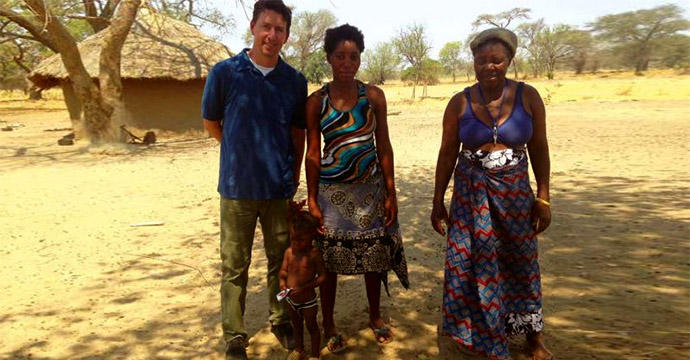
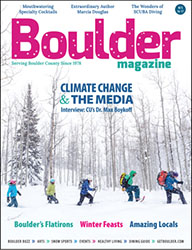 Max Boykoff’s research was the subject of a cover story in the winter/spring 2016-2017 issue of Boulder Magazine.
Max Boykoff’s research was the subject of a cover story in the winter/spring 2016-2017 issue of Boulder Magazine. 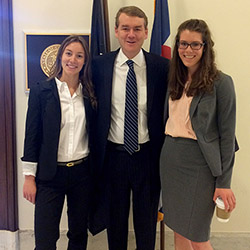 For the fourth year CSTPR is sponsoring a campus-wide competition to select two students to attend (all expenses paid) the AAAS Catalyzing Advocacy in Science and Engineering (CASE) workshop in Washington, DC. April 2-5. The competition has been supported all four years by the University of Colorado Graduate School and Center for STEM Learning. More information is
For the fourth year CSTPR is sponsoring a campus-wide competition to select two students to attend (all expenses paid) the AAAS Catalyzing Advocacy in Science and Engineering (CASE) workshop in Washington, DC. April 2-5. The competition has been supported all four years by the University of Colorado Graduate School and Center for STEM Learning. More information is 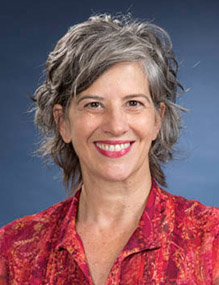 Leslie earned her PhD in Technology, Media & Society from the ATLAS Institute at CU-Boulder’s College of Engineering and Applied Science. Her research and practice integrates climate change, livelihoods vulnerability, and communication technologies to support resilience in communities facing environmental distress. She has expertise in Information and Communication Technology for Development (ICTD); Integrated Water Resource Management (IWRM); and the ICTs, Climate Change and Development (ICCD) model.
Leslie earned her PhD in Technology, Media & Society from the ATLAS Institute at CU-Boulder’s College of Engineering and Applied Science. Her research and practice integrates climate change, livelihoods vulnerability, and communication technologies to support resilience in communities facing environmental distress. She has expertise in Information and Communication Technology for Development (ICTD); Integrated Water Resource Management (IWRM); and the ICTs, Climate Change and Development (ICCD) model.  The Center for Science and Technology Policy Research at the University of Colorado Boulder is leading a strategic planning process for a Science and Technology Policy Fellows (STPF) Program within the Colorado State Legislature and Executive Branch Agencies. The intended program will place highly trained PhD-level scientists and engineers in one-year placements with decision-makers to provide an in-house source of evidence-based information and a resource for targeted policy-relevant research. Fellows will learn the intricacies of the state policy-making process, be exposed to opportunities for science to inform decisions, and develop a deeper appreciation for Colorado’s science and technology needs. The program’s ultimate goal is to help foster a decision-making arena informed by evidence-based information relevant to emerging and current policy issues. Throughout 2017, this effort will develop the strategic plan for the program by engaging partners within and beyond the University of Colorado, including key collaborators with experience working with the Colorado legislature.
The Center for Science and Technology Policy Research at the University of Colorado Boulder is leading a strategic planning process for a Science and Technology Policy Fellows (STPF) Program within the Colorado State Legislature and Executive Branch Agencies. The intended program will place highly trained PhD-level scientists and engineers in one-year placements with decision-makers to provide an in-house source of evidence-based information and a resource for targeted policy-relevant research. Fellows will learn the intricacies of the state policy-making process, be exposed to opportunities for science to inform decisions, and develop a deeper appreciation for Colorado’s science and technology needs. The program’s ultimate goal is to help foster a decision-making arena informed by evidence-based information relevant to emerging and current policy issues. Throughout 2017, this effort will develop the strategic plan for the program by engaging partners within and beyond the University of Colorado, including key collaborators with experience working with the Colorado legislature.